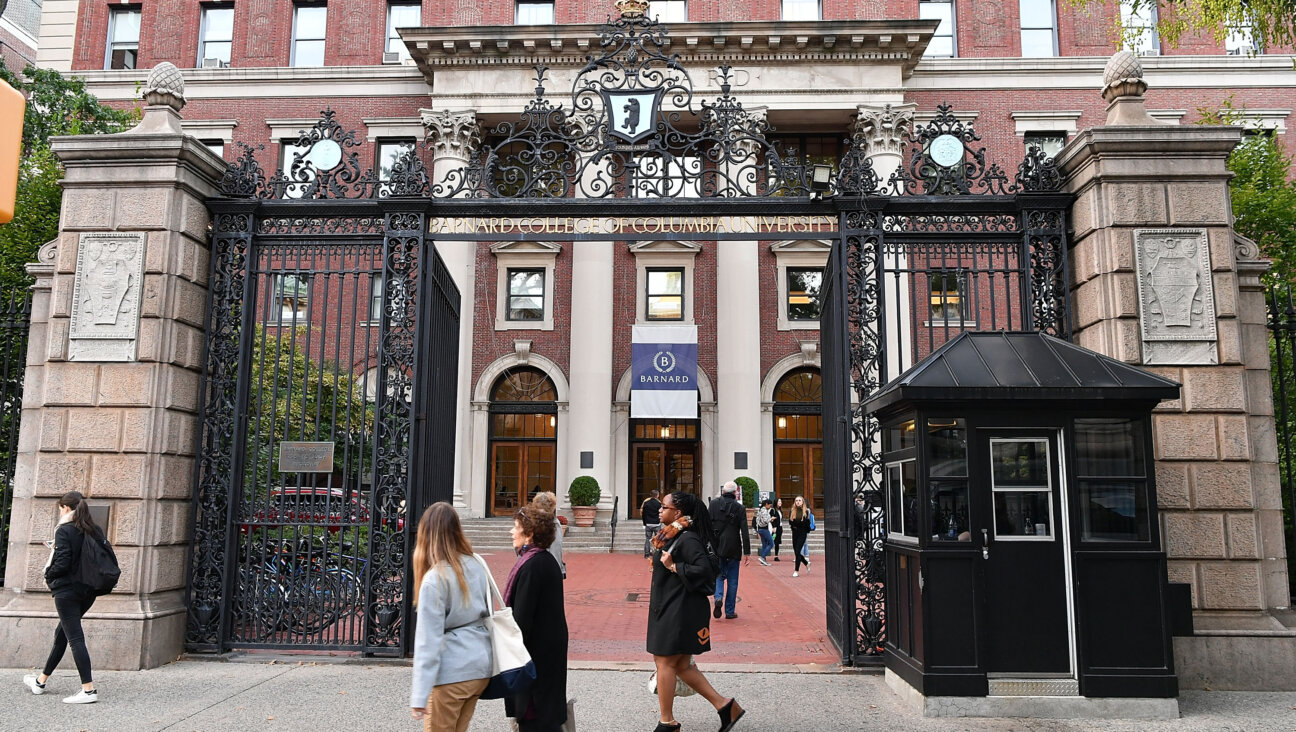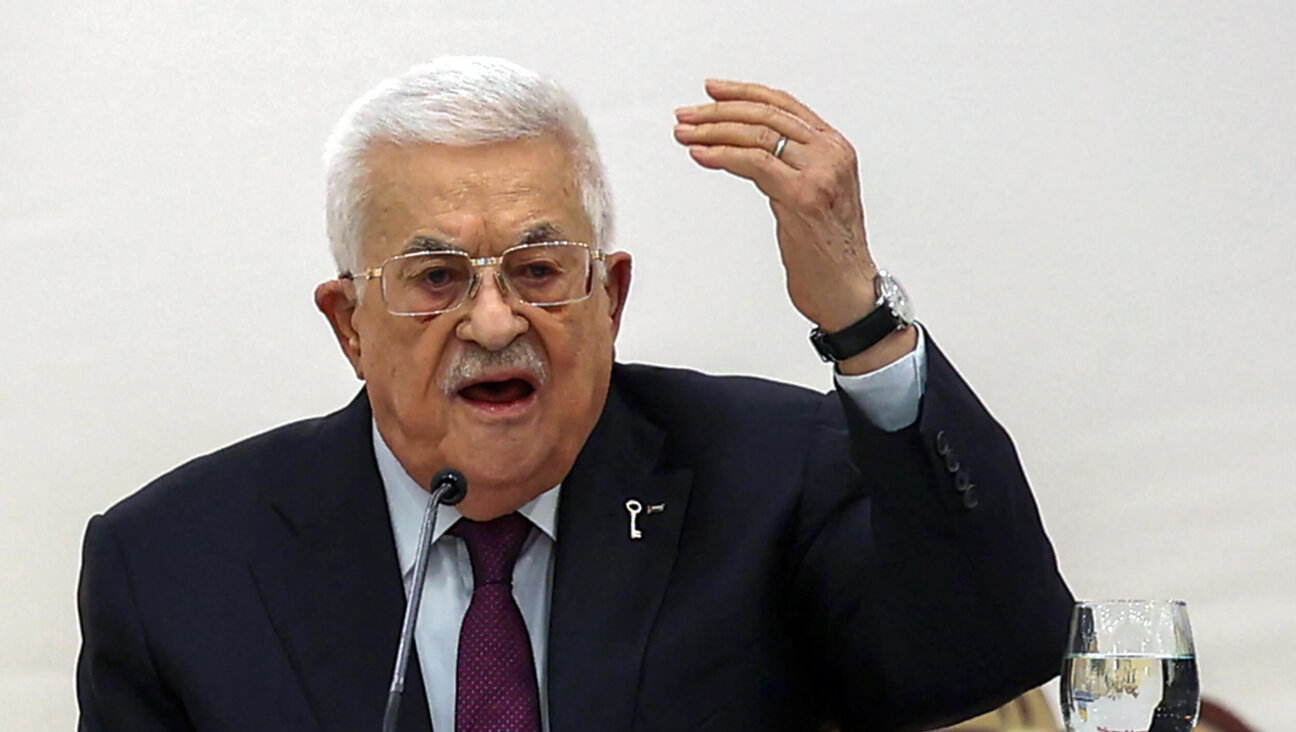Forward Books
At the end of the classic John Ford Western, “The Man Who Shot Liberty Valance,” after Senator Ransom Stoddard (played by James Stewart) confesses that he is not the genuine hero people have made him out to be, a local newspaper editor gives this immortal reply: “This is the West, sir. When the legend becomes fact, print the legend.”
Separating fact from legend was the goal of historian David M. Crowe when he set out to write a biography of Oskar Schindler, the German businessman who saved 1,100 Jews during the Holocaust. Schindler’s portrayal, first in the 1982 novel “Schindler’s List” by Thomas Keneally and then in the 1993 movie by Steven Spielberg, was of a deeply flawed and morally compromised man who for reasons known only to himself ended up performing a miracle.
Crowe, a professor at Elon University in North Carolina, spent more than seven years probing every aspect of Schindler’s life. He traveled to Czechoslovakia, Germany, Poland, Argentina and Israel. He retraced Schindler’s footsteps, examined thousands of documents, and spoke, it seems, to anyone and everyone still alive who came in contact with the man. At the end of his exhaustive 766-page biography, Crowe concludes that Schindler was in fact a deeply flawed and morally compromised man who for reasons known only to himself ended up performing a miracle.
It turns out that Keneally and Spielberg, despite numerous factual errors (in what it must be remembered were works of historical fiction), pretty much got Schindler right. No one is more surprised by this than Crowe himself. He writes that he began his research doubting “the merits of Schindler’s postwar acclaim.” What happened to Crowe in the course of his research was the same thing that had happened to Keneally and Spielberg, and it is one of the most fascinating — and unexamined — aspects of the Schindler saga. Crowe, like his predecessors, came under the spell of the Schindlerjuden.
Nearly all these 1,100 souls came to believe that Oskar Schindler had given them the gift of life at the risk of losing his own. Literally from the moment the war ended, they set out not only to protect and to reward their savior, but also to get the world at large to recognize his feat. Despite Schindler’s appalling drunkenness and womanizing, his abandonment of his impoverished wife (who also helped save many Schindler Jews), his financial irresponsibility and shameless freeloading, even evidence that he had a hand in the beating of two Jewish businessmen during the war, the Schindler Jews rode to his rescue repeatedly and defended his honor.
It was a remarkable role reversal. During the war, at his factories in Kraków, in Poland and later in Brünnlitz in what is now the Czech Republic, Schindler became the benevolent paterfamilias. When he addressed “his Jews” as a group in those desperate days when death was as close as the hairs on the back of one’s neck, he called them “children.”
After the war, Schindler became the child and his beloved Schindlerjuden the doting and indulgent parents. In the last days of the war, six of his Jews accompanied Schindler and his wife west to make sure he was not captured by the Red Army or prosecuted as a war criminal. Schindler Jews appealed to the American Jewish Joint Distribution Committee, the famous relief agency that supported Holocaust survivors in postwar Europe, to loan him money. And when Schindler defaulted on the loans, they got the JDC to lend him more (which he also didn’t pay back). The Schindler Jews even helped him obtain compensation from the West German government for the loss of the factories he had stolen from Jews in Poland when he was a Nazi carpetbagger.
As the years passed and Schindler failed in one venture after another, he became a kind of professional, righteous gentile. As early as 1951, Schindler Jew Leopold Page was pitching a Schindler movie to famed Austrian director Fritz Lang with Schindler’s help. After a deal with Metro Goldwyn Mayer fell apart in the 1960s, Page sold Keneally on the story. He then called Spielberg every week for 10 years until the director finally came through.
Such devotion poses a big problem for a historian because many of the accounts of Schindler’s wartime activities were written afterward by him or by the people he saved, when all were eager to play down Schindler’s role as a German spy, Nazi party member and expropriator of Jewish property, and to play up his role as a hero. Sometimes Crowe alludes to the hidden agendas of his source materials, but not often enough and not in any comprehensive fashion.
What contemporaneous evidence Crowe does dig up provides ample grist for an alternative, less charitable profile of Schindler. A Sudeten German, Schindler was recruited as an agent by the Abwehr, the German army’s counterintelligence service, in the mid-1930s. He subsequently helped the Reich dismember Czechoslovakia and conquer Poland. He then followed the German army into Poland, where he, sometimes brutishly, acquired businesses at fire-sale prices from persecuted Jews.
Schindler figured out early on that he had no knack for management, so he left the details to several astute Jews who in return were allowed to remain alive. Hiring more Jewish workers was “simply good business,” Crowe observes, because they were cheaper and more dependable than Poles. So, too, was shielding them from the German SS.
No one is quite sure when Schindler switched from protecting his investments to actively helping his Jews for their own sakes,
but it roughly corresponded with Germany’s declining fortunes. By the last year of the war, when Schindler was taking his biggest risks, it was clear that Jewish good will might be the only thing that would save him from being tried as a war criminal. Indeed, Schindler’s naive dream was to set up a factory in his native Czech region after the war, with his Jews as employees.
Given these facts and Schindler’s many foibles, what was it about the man that inspired such loyalty? Other righteous gentiles took equal or more daring risks to save Jews, but they languish in obscurity.
Unfortunately, Crowe only hints at the answer, but Schindler clearly had a special charisma. How else can you explain the fact that when he was flat broke at age 62, he wooed his final mistress after approaching her on a beach in Tel Aviv, so drunk that he didn’t realize the hot sand had burned his feet bloody? Several of the female Schindler Jews also told Crowe that the real Schindler was more attractive than the reel Schindler — played by actor Liam Neeson, who is far from lacking in sex appeal among women I know.
After Schindler died in Frankfurt in 1974, at age 66, the Schindlerjuden brought his body to Jerusalem for burial, even though it was not clear that this was his wish. Despite all they had done for him since the war, many told Crowe through tears that their biggest regret was that they had not done more. The fact that Oskar Schindler is now world renowned and deemed worthy of a meticulous 766-page biography is a tribute not only to the man, but also to the remarkable men and women he saved.
LIST SERVED: After the war, the Jews saved by Schindler’s now-famous ‘list’ took it upon themselves to protect and reward the man they saw as their savior. Despite his drunkenness, womanizing and financial irresponsibility, they repeatedly defended his honor.
Oskar Schindler: The Untold Account Of His Life, Wartime Activities, And the True Story Behind ‘the List’
By David M. Crowe
Westview Press, 766 pages, $30.
* * *|
The Forward is free to read, but it isn’t free to produce

I hope you appreciated this article. Before you go, I’d like to ask you to please support the Forward.
Now more than ever, American Jews need independent news they can trust, with reporting driven by truth, not ideology. We serve you, not any ideological agenda.
At a time when other newsrooms are closing or cutting back, the Forward has removed its paywall and invested additional resources to report on the ground from Israel and around the U.S. on the impact of the war, rising antisemitism and polarized discourse.
This is a great time to support independent Jewish journalism you rely on. Make a gift today!
— Rachel Fishman Feddersen, Publisher and CEO
Support our mission to tell the Jewish story fully and fairly.
Most Popular
- 1

Opinion The dangerous Nazi legend behind Trump’s ruthless grab for power
- 2

Opinion I first met Netanyahu in 1988. Here’s how he became the most destructive leader in Israel’s history.
- 3

Opinion Yes, the attack on Gov. Shapiro was antisemitic. Here’s what the left should learn from it
- 4

News Who is Alan Garber, the Jewish Harvard president who stood up to Trump over antisemitism?
In Case You Missed It
-

Opinion A Holocaust perpetrator was just celebrated on U.S. soil. I think I know why no one objected
-

Fast Forward Barnard staff receive texts asking if they’re Jewish, as government hunts antisemitic harassment on campus
-

Opinion A Palestinian leader just gave Trump an unprecedented opening to pursue peace
-

Fast Forward NIH bans grants for schools that boycott Israeli companies
-
Shop the Forward Store
100% of profits support our journalism
Republish This Story
Please read before republishing
We’re happy to make this story available to republish for free, unless it originated with JTA, Haaretz or another publication (as indicated on the article) and as long as you follow our guidelines.
You must comply with the following:
- Credit the Forward
- Retain our pixel
- Preserve our canonical link in Google search
- Add a noindex tag in Google search
See our full guidelines for more information, and this guide for detail about canonical URLs.
To republish, copy the HTML by clicking on the yellow button to the right; it includes our tracking pixel, all paragraph styles and hyperlinks, the author byline and credit to the Forward. It does not include images; to avoid copyright violations, you must add them manually, following our guidelines. Please email us at [email protected], subject line “republish,” with any questions or to let us know what stories you’re picking up.















